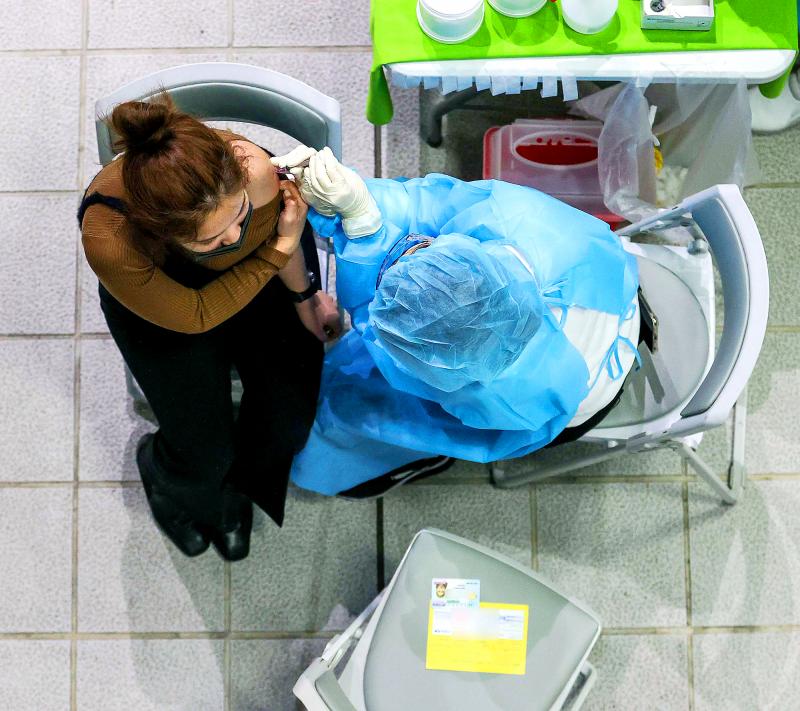The locally developed Medigen COVID-19 vaccine has successfully completed a phase 3 clinical trial in Paraguay and received emergency use authorization (EUA) from the South American nation.
The Taiwanese vaccine manufactured by Medigen Vaccine Biologics Corp (高端疫苗) was hailed by Taiwanese experts as an important milestone for domestically produced vaccines.
Medigen’s vaccine has been gaining recognition from international institutions. It has been included in the WHO’s Solidarity Trial Vaccines program and received a US$2.3 million grant from the Coalition for Epidemic Preparedness Innovations to conduct a mix-and-match trial.

Photo: CNA
A double-blind, randomized study was used in the clinical trial in Paraguay to compare Medigen’s vaccine with that made by AstraZeneca, Taiwan Immunization Vision and Strategy (台灣疫苗推動協會) chairman Huang Yu-cheng (黃玉成) said.
The results of the trial were similar to data collected from the phase 2 trial conducted in Taiwan.
Infectious-disease expert Lee Ping-ing (李秉穎) said that he was not surprised by the results and believes that Medigen’s vaccine would be approved by more nations.
Lee said that he hoped Taiwanese vaccines would no longer be politicized, but be generally accepted by Taiwanese.
Medigen is now waiting for the results of the WHO’s Solidarity Trial Vaccines clinical study, which evaluates the effectiveness of vaccines from around the world.
If the trial proceeds as scheduled, the results are expected by the end of next month or in early April, Medigen chief executive officer Charles Chen (陳燦堅) said.
The company already has capacity to manufacture more than 100 million doses in preparation for a shift from domestic to international markets, he said.
The pandemic has offered an opportunity for domestic manufacturers to develop vaccines and for Academia Sinica to improve its mRNA-related technologies, Huang said.
The experience gained and the growth in research and development would hopefully lead to quicker responses to future pandemics, he said.
Additional reporting by CNA

Intelligence agents have recorded 510,000 instances of “controversial information” being spread online by the Chinese Communist Party (CCP) so far this year, the National Security Bureau (NSB) said in a report yesterday, as it warned of artificial intelligence (AI) being employed to generate destabilizing misinformation. The bureau submitted a written report to the Legislative Yuan in preparation for National Security Bureau Director-General Tsai Ming-yen’s (蔡明彥) appearance before the Foreign Affairs and National Defense Committee today. The CCP has been using cognitive warfare to divide Taiwanese society by commenting on controversial issues such as Taiwan Semiconductor Manufacturing Co’s (TSMC, 台積電) investments in the

INVESTIGATION: The case is the latest instance of a DPP figure being implicated in an espionage network accused of allegedly leaking information to Chinese intelligence Democratic Progressive Party (DPP) member Ho Jen-chieh (何仁傑) was detained and held incommunicado yesterday on suspicion of spying for China during his tenure as assistant to then-minister of foreign affairs Joseph Wu (吳釗燮). The Taipei District Prosecutors’ Office said Ho was implicated during its investigation into alleged spying activities by former Presidential Office consultant Wu Shang-yu (吳尚雨). Prosecutors said there is reason to believe Ho breached the National Security Act (國家安全法) by leaking classified Ministry of Foreign Affairs information to Chinese intelligence. Following interrogation, prosecutors petitioned the Taipei District Court to detain Ho, citing concerns over potential collusion or tampering of evidence. The

‘COMPREHENSIVE PLAN’: Lin Chia-lung said that the government was ready to talk about a variety of issues, including investment in and purchases from the US The National Stabilization Fund (NSF) yesterday announced that it would step in to staunch stock market losses for the ninth time in the nation’s history. An NSF board meeting, originally scheduled for Monday next week, was moved to yesterday after stocks plummeted in the wake of US President Donald Trump’s announcement of 32 percent tariffs on Taiwan on Wednesday last week. Board members voted to support the stock market with the NT$500 billion (US$15.15 billion) fund, with injections of funds to begin as soon as today. The NSF in 2000 injected NT$120 billion to stabilize stocks, the most ever. The lowest amount it

NEGOTIATIONS: Taiwan has good relations with Washington and the outlook for the negotiations looks promising, Minister of Economic Affairs J.W. Kuo said Taiwan’s GDP growth this year is expected to decrease by 0.43 to 1.61 percentage points due to the effects of US tariffs, National Development Council (NDC) Minister Paul Liu (劉鏡清) said at a meeting of the legislature’s Economics Committee in Taipei yesterday, citing a preliminary estimate by a private research institution. Taiwan’s economy would be significantly affected by the 32 percent “reciprocal” tariffs slapped by the US, which took effect yesterday, Liu said, adding that GDP growth could fall below 3 percent and potentially even dip below 2 percent to 1.53 percent this year. The council has commissioned another institution